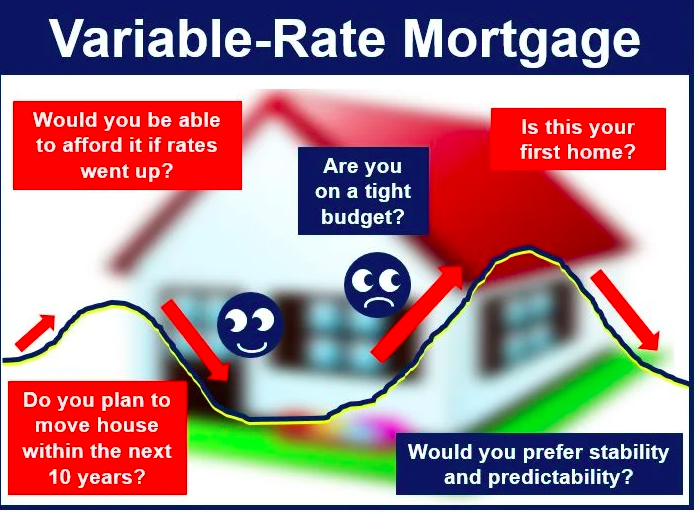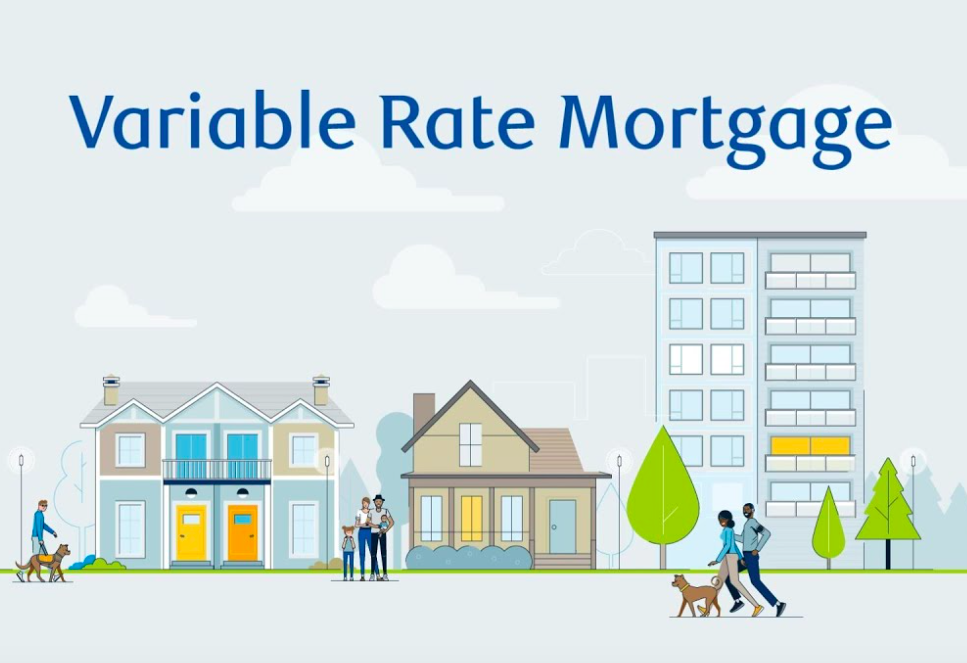A Variable-rate Loan is a type of Mortgage loan which have fluctuating interest rates based on the current financial market. It is the Mortgage Loan with a rate that changes. The Interest rate is tied to a benchmark which varies depending on the Mortgage Lender, and it rises or falls based on the benchmark. A Variable-rate Mortgage is a type of Mortgage Loan in which the rate of interest is not fixed. Instead, Interest payments will be adjusted at a level above a specific benchmark or reference rate such as prime rate plus 2 points.
A Variable-rate Mortgage allows borrowers to potentially benefit from lower rates and reduce the monthly payments. However. it is important to consider the risks involved, as Variable-rate Loans come with the possibility of interest rate increases and higher mortgage payments as well. A Variable-rate Loan often comes with a lower interest rate than a fixed-rate mortgage loan but as its name implies the Interest rates can vary or change during the life of the Loan. Variable-rate mortgages will most often utilize an index rate, such as the Prime Rate or the Fed funds rate, and then add a loan margin on top of it.
With a Fixed-rate Mortgage, the amount the homebuyers pay each month remains the same for the term of their Mortgages. That payment is divided into two parts the amount that goes towards the Principal and the amount that goes towards Paying Interest. Variable-rate Mortgage Loans work in similar ways in that the borrower’s monthly payment is the same giving them month-to-month stability. If the prime rate goes down, then the monthly payments also go down. However, during a period of rising interest rates, as the Prime rate goes up, the amount of interest the homeowners pay on their loans also goes up.
What Is Variable-rate Mortgage?
A Variable-rate Mortgage Loan is a type of Mortgage Loan where the interest rate changes according to changes in the market interest rates. Unlike the Fixed-rate Loan, where the homebuyers pay a constant interest rate, a Variable-rate Mortgage comprises varying monthly payments that change according to the market interest rate changes. An Adjustable-rate mortgage is tied to a short-term interest rate, whose shocks directly affect the variable rate, unlike the fixed-rate mortgage, whose interest rate is long-term and less sensitive to the adjustment in the policy rate. Most homeowners prefer a variable-rate mortgage when they anticipate a future decline in interest rates. The Variable interest rate is often the prime rate plus a few percentage points which is the profit for the Mortgage Lender. A variable rate typically starts out cheaper than fixed interest rates, but it can potentially increase and be more costly a few years into the Mortgage Terms.
How Do Variable-Rate Loans Work?
A Variable-rate Mortgage differs from a Fixed-rate Mortgage in that the Interest rates during the same Portion of the Loan’s duration are structured as floating and not fixed. The Mortgage lenders offer both Variable-rate Loans and adjustable-rate Mortgage Loan products with differing Variable-rate structures. Generally, mortgage lenders can offer mortgage borrowers either fully amortizing loans or non-amortizing loans that incorporate different variable rate interest structures. Variable-rate Loans are typically favored by homeowners who believe the Interest rate will fall over time. The term Variable-rate Loans will charge borrowers variable rate interest throughout the entire life of the loan. In Variable-rate Loans, the borrower’s interest rate will be based on the indexed rate and any margin that is required.

What Are the Benefits of Variable-rate Loans?
From the borrower’s perspective, Variable-rate Mortgage loans are beneficial because they are often subject to lower interest rates than Fixed-rate Mortgage loans. Most often, the rate of interest tends to be lower at the start, and it may adjust in the course of the loan terms. However, during a period of constantly fluctuating interest rates, a fixed-rate mortgage loan tends to be more attractive than a Variable-rate Loans tends to be more attractive than a Variable-rate Loans. In such cases, fixed-rate Mortgage loans come with a rate of interest that remains unchanged during the duration of the loan.
What Are the Types of Variable-rate Loans?
Here are some types of Variable-rate Mortgage loans:
- Mortgage Loans: The funding is used to purchase the real estate, typically a home for the borrower. The Mortgage rates usually vary depending on the borrower’s credit score, income, property value, etc.
- Home Equity Lines of Credit: A credit line where the limit is calculated based on the equity in the borrower’s collateral.
- Auto Loans: The funding is used to purchase the vehicle.
- Credit Cards: Revolving lines of credit that typically do not require collateral.
- Personal Loans: A versatile form of funding best suited for financial emergencies.
- Student Loans: Funding is used to pay the higher education, usually at a college or university.
How To Calculate the Variable-rate Loans?
The Interest rates for the Variable-rate Loans are calculated using these factors such as:
Pros:
- The Interest rate goes down immediately with falling Interest rates.
- The amount borrowers pay every month stays the same.
- Variable-rate Loans often offer options and flexibility
- The benchmark rate will go down, which means the interest rate on your loan will also go down.
Cons:
- The Interest rate goes immediately with rising Interest rates.
- The amount homebuyers pay into their principal gets eroded with rising interest rates.
- The Payment may go up once the borrowers hit the trigger rate.
- The amortization period may get longer than the initial term.
Frequently Asked Questions (FAQs)
Answer: Eligibility for Variable-rate Loans can be determined by several factors, such as:
- Income.
- Credit history.
- Assets (investments, etc.)
- Financial history.
